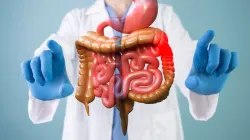Do you know COVID-19 can damage your gut health? 8 ways to support your digestive system
The disruption in gut health due to COVID-19 can negatively impact the body's ability to fight off infections and increase susceptibility to various diseases. Therefore, it is crucial to maintain a healthy diet and lifestyle during this time to support gut health and boost overall immunity.

The COVID-19 pandemic had a significant impact on the world, not only in terms of public health but also on various aspects of daily life. One area that has been affected by this virus is gut health. The gut microbiome plays a crucial role in maintaining overall health and immunity. However, due to the stress and anxiety induced by the pandemic, people's eating habits have changed, leading to an imbalance in the gut microbiome.
According to Dr Adi Rakesh Kumar, Consultant Gastroenterologist, Therapeutic Endoscopist & Endocrinologist, Yashoda Hospitals Hyderabad, COVID-19 infection can sometimes lead to Gastrointestinal Symptoms like diarrhoea, vomiting and uncommon liver inflammation ( acute hepatitis).
Certain measures to improve GUT and liver health
Probiotics: After an infection, replenish your gut with probiotics found in yoghurt or supplements to restore a healthy balance of bacteria.
Hydrate Adequately: Maintain proper hydration to support digestion and flush out toxins, aiding in the recovery process.
Gradual Dietary Transition: Ease back into a regular diet with easily digestible foods like soups, steamed vegetables, and lean proteins to avoid overwhelming your system.
Include Fiber-Rich Foods: Integrate fibre gradually through fruits, vegetables, and whole grains to promote regular bowel movements and support overall gut health.
Limit Processed Foods: Minimise processed and high-fat foods, as they can be harder to digest and may exacerbate post-infection digestive issues.
Manage Stress Levels: Practice stress-reducing activities like meditation or yoga, as stress can negatively impact digestion and hinder the recovery process.
Consult a Healthcare Professional: If digestive issues persist, seek guidance from a healthcare professional to rule out any lingering complications and receive personalized advice for a speedy recovery.
ALSO READ: Irritable Bowel Syndrome VS Inflammatory Bowel Disease: Expert explains the difference
